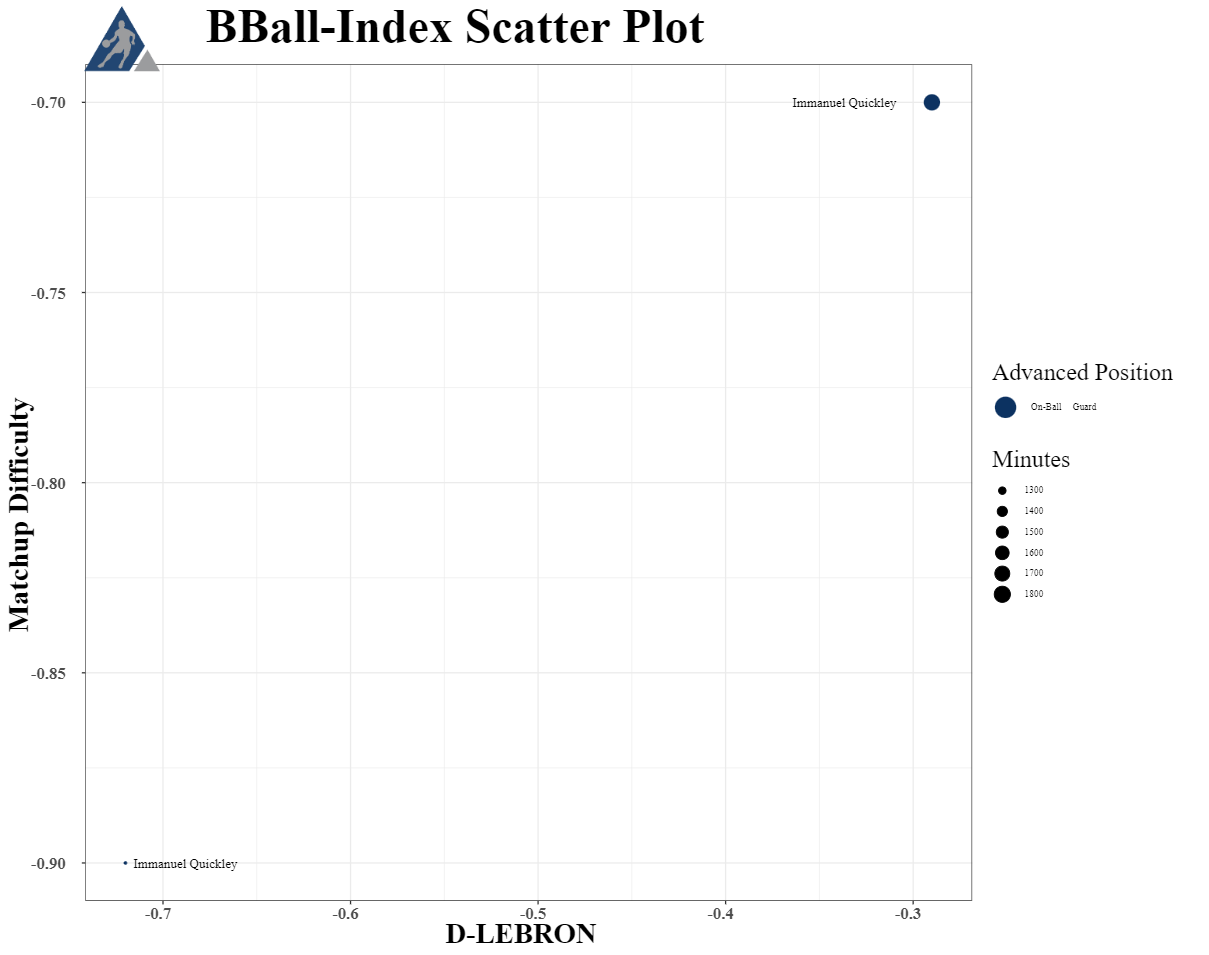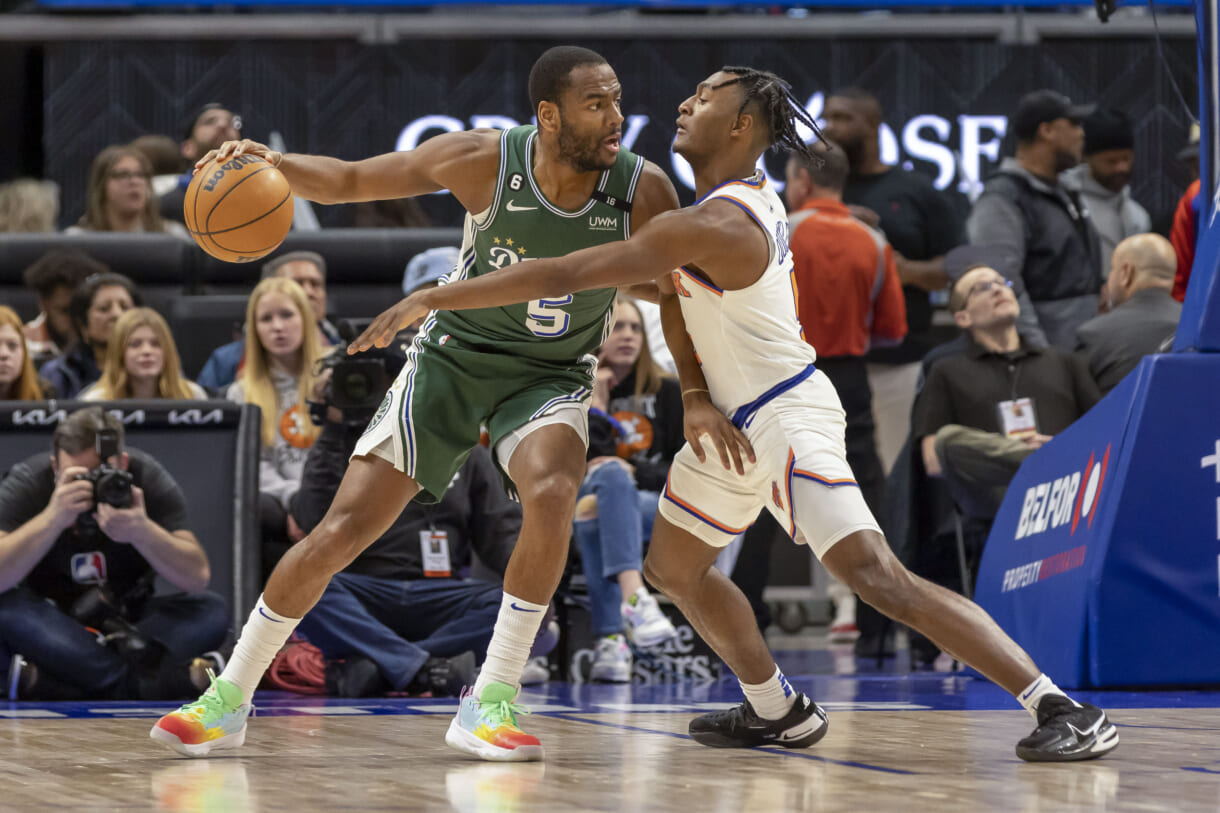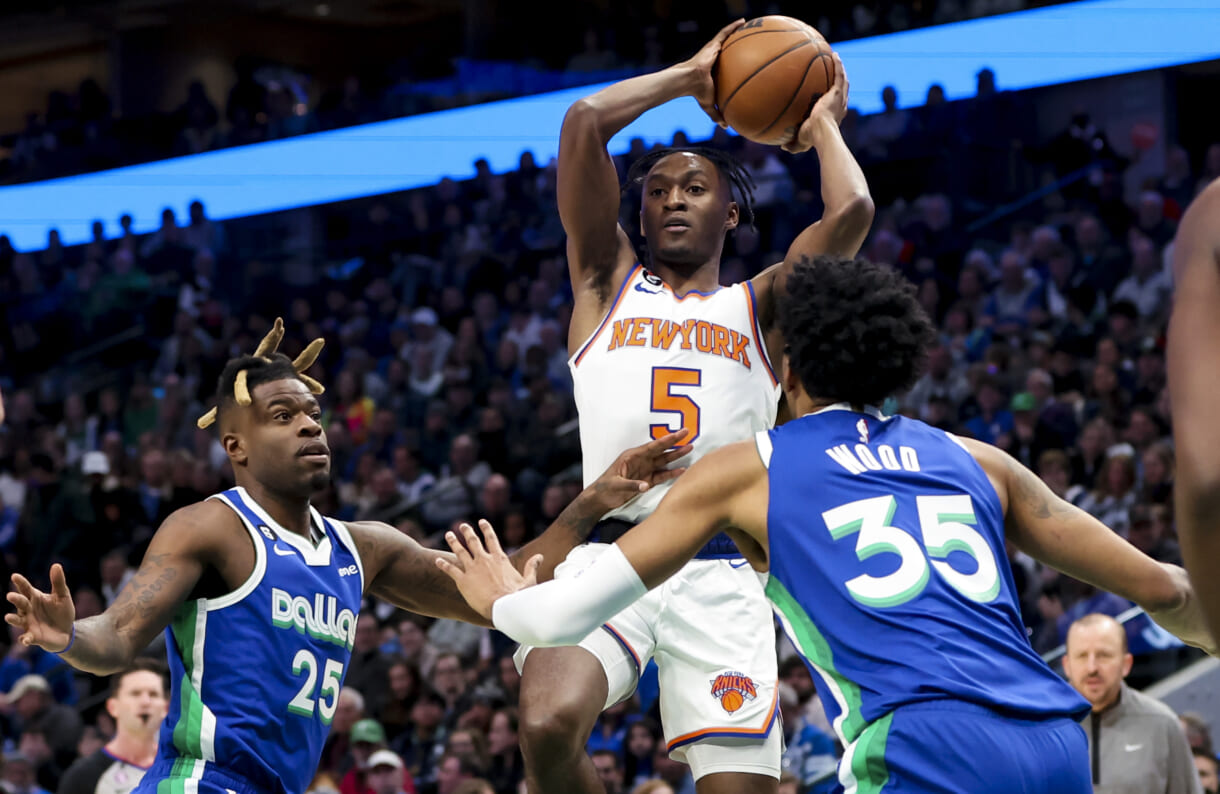
Ahead of the 2020-2021 season, the Knicks used a late first-round pick to draft Kentucky guard Immanuel Quickley. The Knicks needed guard help and shooting, and Quickley would look to provide both of that off of the bench for a team with no expectations. He’d play a huge part in their run to the 4th seed but was seen as just an offensive sparkplug and defensive liability. This wasn’t a bad outcome for a pick in the mid-20s of the draft, and he had plenty of growing left to do. Fast forward to year 3, and the Knicks have one of the best 6th men in basketball on both sides of the ball.
- Knicks’ rising sharpshooter could see a minutes reduction
- Projecting the Knicks’ starting 5 for the 2024-25 season
- Knicks’ developmental center could be ready to take a big step forward
Immanuel Quickley Has Changed the Narrative Defensively
As previously mentioned, Quickley was viewed as a defensive liability at the guard position, which was part of the reason the Knicks (incorrectly) played Elfrid Payton in the starting lineup over Quickley. Tom Thibodeau was trying to put the Knicks in a better defensive situation in year 1, and while it worked out in the regular season, it wasn’t stable enough for a playoff environment. The Atlanta Hawks pummeled the Knicks in 5 games, and the offense came to a screeching halt outside of a Game 2 win at home. If Immanuel Quickley wanted to win over his coach’s good graces, he’d have to prove he can hold his own defensively.
We saw the minutes go up for Quickley, and the defensive improvement was night and day. Quickley wasn’t an elite defender by any means, but he took a massive unexpected leap in his defensive development. Remember, at the time, it was expected that Quickley would develop better defensive instincts that would allow him to be more than a turnstile at the PG position. Instead, he went from well below average to close to league average, which went a long way in his ability to positively impact the game. To add to the improved defensive value, he also took on tougher defensive assignments, adding to his value on the defensive side of the ball.

Quickley was still roughly a league-average defensive point guard, but year 2 was a huge leap for him to take. It raised the initially perceived ceiling he could have defensively, and it made year 3 an exciting season to see if he could continue his defensive progress. In terms of raw defensive value, Quickley’s year 3 leap isn’t as monumental as year 2’s, but it’s still trending upward, and his defensive approach has changed dramatically as well. He’s become a more aggressive defender and has made being a pesky defender on the perimeter part of his identity on the court.
Quantifying effort can be extremely difficult, considering that you can’t really differentiate between good and great effort, but there does seem to be some added intensity to Quickley defensively. On this possession against the 76ers, he mostly erases Milton from the offensive possession, and when he finally does gain possession, he’s incapable of getting any separation from the persistent IQ. This leads to Montrezl Harrell having to shoot a 3, which is ideal for the Knicks since he has made just 9 three-pointers in his career.
Being able to put Quickley on an opposing guard has also given the Knicks excellent defensive play from their bench unit, as initially he was paired with Miles McBride, and now he has Josh Hart replacing McBride, so the Knicks can swarm opposing guards with their various 2nd unit combinations. The defensive progress of Immanuel Quickley has played a massive role in the Knicks’ success this year, and he’s quickly finding his defensive identity and role as a leader on the team instead of a liability on that side of the ball.

Quickley’s defensive effort and energy on the court have impacted the team positively in the box score, but there’s a possible off-court impact as well. The Knicks are led by a coach who preaches defensive intensity and effort, and while this team has adopted a much more modern offensive identity, Quickley’s continued to carry a strong defensive effort night in and night out. With his defensive progress well-documented, it’s time to talk about the offensive progress Quickley has shown in year 3.
Immanuel Quickley’s Impact Offensively
While he’ll never put up elite numbers in the assists department, the Knicks have been able to let Quickley run the point for them off the bench with the starters or 2nd unit to great success. He grades out as an above-average playmaker in terms of efficiency and talent level, allowing him to have the ball in his hands for important offensive possessions without it getting “stuck.” The Knicks already have two ball-dominant scorers in Jalen Brunson and Julius Randle, so Quickley knowing when to take over a game offensively and when to play a supplementary role has allowed him to mesh well in any situation during the course of a game.
Quickley’s yet to return to the heights he did in 2020 in terms of three-point shooting, but a 35.7% clip on 4.9 attempts a game is still a strong number. On top of that, Quickley’s improved his floater and interior scoring tremendously, which has led to the best True Shooting rate of his career (56.2%). Quickley has always had a strong floater, but this is easily the best version of that shot that we’ve seen at the NBA level, and the numbers back this up, with each year his numbers on that shot improving.

While the two-point shot is seen as overlooked by analytics, it’s actually quite the contrary. The goal of an offensive possession is to score, that’s about as simple as it gets. In order to have as many successful offensive possessions as possible, you need to create high-percentage looks for scoring options, and some players can do that on their own. Quickley has developed the ability to create shots on his own with this floater, and it means that he’s less dependent on his peers for these higher-percentage shots, thus allowing him to orchestrate an efficient NBA offense.
Obviously, Jalen Brunson is the better offensive point guard, but Quickley does a great job of maintaining the offense when he isn’t on the court. He’s also improved offensively as the season has carried on, averaging 15.7 PPG on 47.7% from the field and 38.1% from downtown. The Knicks have needed his bench scoring all season, though the addition of Josh Hart should give him some more spacing and a scoring option to look for.
It’s not enough to call Quickley a solid offensive player, he’s quietly become one of the best offensive weapons for any offense due to his versatility. You can plug-and-play Immanuel Quickley in any lineup, especially on a Knicks team that has shown an over-reliance at times on their two stars. This eases the burden on both of them and keeps them fresh for the most crucial moments of a game. It’s also made Quickley a great player to have in a closing lineup, as in these clutch situations, he can create his own shot if need be instead of just waiting for an open look that may never come.
This is the most efficient version of Immanuel Quickley scoring-wise, and in terms of playmaking, he can always step up when the Knicks need him. He’s not just a shooter you leave in the corner or an undersized guard who takes too many shots, he’s a perfect secondary scoring option in a modern NBA offense.
The Knicks Need to Keep Immanuel Quickley Around
After this season, Immanuel Quickley will have just one year remaining on his rookie deal. That doesn’t mean the Knicks are doomed and can’t re-sign him, but if they haven’t begun extension talks already, they 100% should. Outside of Josh Hart, the Knicks don’t have any notable free agents, with Barrett-Brunson-Randle-Robinson all extended. It’s possible that the Knicks move RJ Barrett in the summer due to poor defensive play and a questionable fit next to Brunson/Randle, they’d most likely do so in return for a player making as much money, if not more.
The Knicks could also wait until after the 2023-2024 season to bring back Quickley, as Evan Fournier’s club option can be declined, opening up more cap space for the Knicks. The RJ Barrett deal kicking in will cause some financial constraints, but it isn’t anything detrimental to the Knicks long-term if he has any sort of resurgence. It feels almost like a must to retain Quickley, though injuries/regression could change their willingness to do so if they wait to see how he does in year 4. It’s hard to find a player like Quickley, as while he may just be a “good” player at his true talent level, his synergy with the lineup increases said value.

It’s simply impossible to argue that the Knicks aren’t better with Immanuel Quickley, and they should do everything within reason to keep the young guard around for the future. He’s become the 3rd best player on a Knicks team that could have their best win total since the 2012-2013 Knicks, led by future Hall of Famer Carmelo Anthony. Immanuel Quickley’s game has come so far since his rookie season, and he’s a complete guard that makes a positive impact every night one way or another.